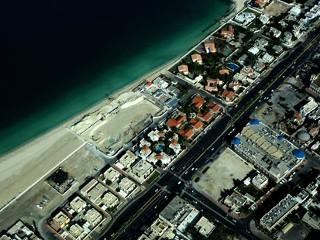By Aunohita Mojumdar
A recent survey by Integrity Watch Afghanistan (IWA) shows a sharp expansion in corruption in Afghan society. Most Afghans now see the payment of bribes as a routine part of obtaining government services.

An aerial view shows villas and houses along the coast of the Gulf emirate of Dubai on December 17, 2009. A number of Afghan businesspeople have purchased expensive villas in Dubai, once only attractive as a golfer's paradise. These include a brother and a cousin of Afghan President Hamid Karzai, one of Karzai's former vice presidents and the brother of Mohammad Qasim Fahim, one of the country's two current vice presidents.(Photo: Marwan Naamani/AFP/Getty Images)
In the three years since IWA came out with its previous corruption survey, the amount paid in bribes more than doubled, the watchdog group found. Afghans paid an estimated $1 billion in bribes in 2009, whereas IWA pegged the figure in its 2006 survey at $466 million. More worryingly, so-called commission-kars, or fixers, are seen increasingly as a permanent part of the social landscape. These middlemen are believed to be involved in up to 40 percent of bribery transactions.
Though international attention has focused primarily on high-level corruption, it is the day-to-day graft involved in the provision of basic government services that impacts most Afghans. Overall, 28 percent of Afghan households had to pay a bribe to receive some sort of public service that, under different conditions, should have been easily accessible. One in seven Afghans was directly involved in a corrupt transaction in some manner, either paying or receiving, IWA found.
IWA’s National Corruption Survey 2010 sampled 6,500 Afghans in 32 of the country’s 34 provinces. The results were released July 8.
Contrary to the image of the Afghan government and its institutions being inefficient and lacking capacity, 70 percent of respondents said they were certain they could get services if they paid a bribe.
The most impoverished Afghans – those with an income of less than $60 per month – appear to be the hardest hit by corruption. This portion of the population felt that corruption, rather than insecurity, is the biggest problem facing Afghanistan.
The polling data painted a mixed picture for President Hamid Karzai’s administration. Somewhat surprisingly, 84 percent of those surveyed perceived the presidential administration as offering the best potential check against corruption. Yet 51 percent of those polled said Karzai’s team was not efficiently dealing with graft.
Interpreting the apparently contradictory findings, IWA Co-Director Lorenzo Delesgues said that Afghan people still had hope for their government, though their expectations were diminishing as they turn in growing numbers to non-state actors to solve their day-to-day problems. “Corruption threatens the legitimacy of state-building” the IWA stated in its report, adding that it was feeding “frustration and support for insurgency” and spurring social conflict.
Half the poll’s respondents indicated that corruption was undermining their faith in the government, and was tacitly serving to enhance the Taliban’s image. At the same time, only 14 percent believe the Taliban is capable of tackling graft.
“It is petty corruption that is eroding people’s trust very slowly,” said Delesgues, adding that even if people do not see the Taliban as a solution, the Islamic militants are still able to capitalize on the perception of government corruption.
Perhaps most unsettling for international actors involved in the stabilization process, the IWA survey found that the justice and security sectors are perceived as the most corrupt in Afghanistan. However, IWA also found that corruption was widespread in state-run health and education services, two areas often seen by donors as the cleanest state sectors. Meanwhile, among government bureaucrats, 29 percent said they had to pay to keep their jobs.



